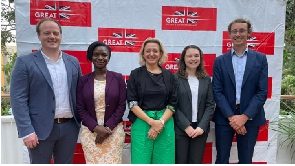 British High Commissioner to Uganda (C) Kate Airey and other officials pose for a picture
British High Commissioner to Uganda (C) Kate Airey and other officials pose for a picture
The British High Commission has urged Ugandans involved in projects that are fighting against effects of climate change to apply for the about Ush53 billion ($14.02 million) fund that the UK government has set up.
Speaking at the launch of the Climate Finance Accelerator programme on Tuesday, Ms Kate Airey, the British High Commissioner to Uganda, said with a young population in the country, the private sector should take advantage of the funding to come up with transformative projects that drive green growth, create jobs, alleviate poverty in the country and sustain the big population.
“How do we create jobs? They will come from you, the private sector. You are key to growth [and] alleviating poverty. Let’s have impactful growth. I like the private sector because of their creativity and innovative ideas. When I am hearing stories from innovators, it gives me hope of where Uganda is going,” Ambassador Airey said.
She explained that with some of the transformative ideas that she has heard from Ugandans, they should apply for the climate financing to take advantage of green growth to invest in projects that fight climate change effects.
She added that this will sustain the anticipated huge population by 2030, as well as produce enough food, which can be exported globally.
Amanda Kabagambe, the managing director of Bethel Advisors, the company managing the funds in Uganda, said this is a global programme coming out of the UK government.
Bethel Advisors give technical assistance to climate responsive projects and these projects have so far been implemented in Colombia, Egypt, Mexico, Nigeria, Peru, South Africa, Turkey and Vietnam.
“We do capacity building as part of the programme to strengthen their operations so that they are able to access capital to scale their projects. We are funded by the UK government. For eligibility for the funding, you can visit our website,” Kabagambe said.
She added that about eight projects are expected to be selected from the energy, water, agriculture, transport, waste management, forestry, and economy. She also said the projects must be at the pre-feasibility stage and require a minimum of $1m (Ush3.7 billion).
The selected projects will receive advice and support ranging from technical and financial expertise to help them secure investment. It will also include improving their financial models, advice on pitching to investors, and how to embed gender equality and social inclusion such as supporting women and disadvantaged communities.